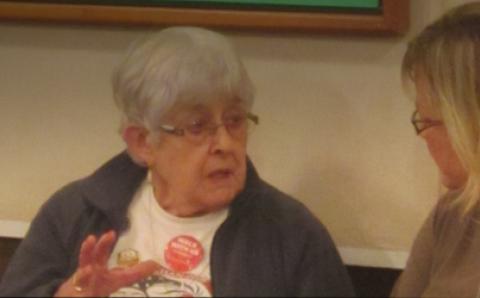Hello. My name is Erika, and I’m going to die. You are going to die too. I don’t know when. I don’t know how. But it’s one of the few things in this life I can say with absolute certainty.
This might seem like an inappropriate way to introduce ourselves to one another. Nonetheless, it’s true. And while I don’t advocate changing the way we greet each other, I do think it’s essential to acknowledge the reality of death—to name it and give it a place. Because whether we are comfortable with it or not, death is a part of every life.
Those of us who live in the 21st century in the western world have the “luxury,” unwise though it may be, of not having to look death in the face. Quality medical care, a deceptively dependable food supply, and countless other unmerited privileges mean that in our part of the world infant and child mortality are rare; many people enjoy long and healthy lives. As a friend who recently emigrated from Cameroon observed, “Your people get so old!”
That is a good thing, of course. I am profoundly grateful for the blessings of three healthy children, a healthy spouse, two sets of healthy parents, and a relatively healthy 97-year-old-grandma. But the dark side of this reality is a growing inability to accept and to incorporate the inevitability of suffering and death into our daily living.
Only a few generations ago people were born at home and died at home. When a person died, loved ones washed and clothed the body and laid it out in a coffin in the living room. Friends, family members, and neighbors stopped by to pay their respects and to comfort the grieving. Usually at least one person sat by the body—held vigil or “waked the body”—until close friends and relatives carried the remains to the funeral and burial. This was still the case when my great-grandfather died in 1946.
Today hospitals and funeral homes have replaced bedrooms and living rooms as the more common venues for death. Medical and funeral home staff now perform tasks once carried out by family members and friends. These professionals provide valuable services. But an unintended consequence of the care they offer has been a general distancing among many people from the reality of death.
What, then, is the rightful place of death? Is it simply a natural part of life that we should strive to accept and embrace? An enemy that we should rage against and fight with our dying breath? Something else entirely?
And where do we go with our questions, uncertainties, and fears?
As believers, we look to God, the Creator and Source of all life. We look to Jesus, who was born and died and lived again. We look to the Holy Spirit, the Breath of life. We turn to the deep, mysterious truths of the Christian faith revealed in God’s Word. While these truths are more than we can humanly comprehend, explain, or prove, they provide the foundation for our ability to live well and to die in hope and expectation.
In the beginning God made us and gave us life, but we rejected his way and tasted death and distance from God. Death is a painful sign of the brokenness within and among creation, people, and God.
But God is Love, so once again God offered us life—this time by sending God-in-the-flesh, Jesus. Counter to all expectations, Jesus died. Three days later—again, counter to all expectations—Jesus rose again. After giving death its due, he showed the mighty, eternal power of life.
And this is the point in the story where we find ourselves today. Jesus, who was raised from the dead, is “the firstfruits of those who have fallen asleep” (1 Cor. 15:20). He is our living proof that death does not have the final say. Jesus shows that he isthe way and the truth and the life (John 14:6). And although this way is through death, our ultimate destination is life, true life.
So what does this biblical teaching mean for how we face and experience death—our own and the deaths of those we love—in our everyday, mortal lives?
Here’s a start: “Brothers and sisters, we do not want you to be uninformed about those who sleep in death, so that you do not grieve like the rest of mankind, who have no hope. For we believe that Jesus died and rose again, and so we believe that God will bring with Jesus those who have fallen asleep in him” (1 Thess. 4:13-14). We grieve because death still wreaks havoc on the life that God has given us. But we grieve with hope. Our hope is in the power and promise of a life that is ultimately impervious to the power of death. Again we turn to the words of Scripture, “Where, O death, is your victory? Where, O death, is your sting?” (1 Cor. 15:55).
Our grieving with hope will take as many different forms as there are people and deaths and those who mourn them. The sudden, traumatic death of a young person is different from the quiet passing of a 90-year old great-grandpa. An unexpected terminal diagnosis cannot be compared to the general knowledge that death comes to everyone.
Although every person and situation is unique, we are called to live thankful, hopeful lives in the ever-present shadow of death. Perhaps the following suggestions could be a starting point for developing a faithful response to that calling, both as individuals and within the family of God.
- Talk about end-of-life health issues with your family and close friends. For example, think about what kind of medical interventions are acceptable or unacceptable to you. Then write them down and name a medical decision-maker to represent you should the need arise.
- Think about what kind of funeral and burial arrangements you prefer, and talk about them with your family. Do you have a favorite Scripture passage or song that you’d like people to sing? Hate the idea of being embalmed? Let your loved ones know.
- Speak openly and honestly with children about death whenever it touches their lives—whether in the death of a grandparent or other family member, a friend, or a pet. Use these opportunities to reassure them and to invite their questions. Leave the door open for further conversation.
- Respect the timing and manner of people’s grief. Losing a beloved friend or family member will permanently affect a person. Although people will make their way through grief, they will never ever “get over” it.
Although death still has a voice, it does not have the last word. The refrain to a well-known Southern gospel song comes to mind:
Because [Jesus] lives, I can face tomorrow
Because he lives, all fear is gone
Because I know he holds the future
And life is worth the living just because he lives.
Because Jesus has the last word, our life is worth the living.
sidebar
For Further Reading
The Art of Dying: Living Fully into the Life to Come by Rob Moll with foreword by Lauren Winner (IVP, 2010)
The Christian Art of Dying: Learning from Jesus by Allen Verhey (Eerdmans, 2011)
“Death, be not proud” by John Donne, from Holy Sonnets
Getting to the Other Side of Grief: Overcoming the Loss of a Spouse by Susan Zonnebelt-Smeenge and Robert C. De Vries (Baker Books, 1998)
In Life and In Death: A Pastoral Guide for Funerals by Leonard J. Vander Zee (Faith Alive Christian Resources, faithaliveresources.org)
Letters to Myself on Dying: A Journal of Hope, Pain, and Courage by Mirth Vos (Baker Books, 1999)
Surprised by Hope: Rethinking Heaven, the Resurrection, and the Mission of the Church by N.T. Wright (HarperOne, 2008)
The Undertaking: Life Studies from the Dismal Tradeby Thomas Lynch (W.W. Norton and Co., 2009)
Wit: A Play by Margaret Edson (Faber & Faber, 1999)
About the Author
Rev. Erika Dekker is a wife, mother, and Christian Reformed pastor working as a part-time chaplain at the Continuing Care Center in Grand Rapids, Mich.








